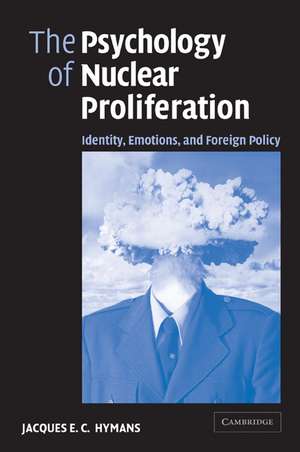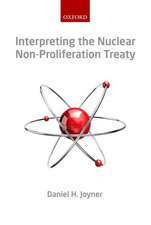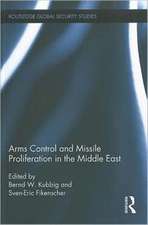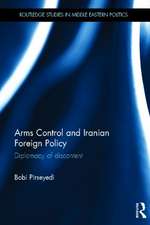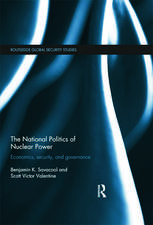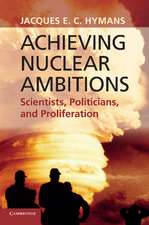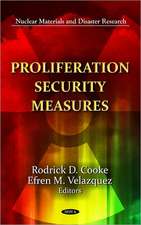The Psychology of Nuclear Proliferation: Identity, Emotions and Foreign Policy
Autor Jacques E. C. Hymansen Limba Engleză Paperback – 15 feb 2006
| Toate formatele și edițiile | Preț | Express |
|---|---|---|
| Paperback (1) | 288.25 lei 43-57 zile | |
| Cambridge University Press – 15 feb 2006 | 288.25 lei 43-57 zile | |
| Hardback (1) | 721.02 lei 43-57 zile | |
| Cambridge University Press – 15 feb 2006 | 721.02 lei 43-57 zile |
Preț: 288.25 lei
Nou
Puncte Express: 432
Preț estimativ în valută:
55.17€ • 59.95$ • 46.38£
55.17€ • 59.95$ • 46.38£
Carte tipărită la comandă
Livrare economică 21 aprilie-05 mai
Preluare comenzi: 021 569.72.76
Specificații
ISBN-13: 9780521616256
ISBN-10: 0521616255
Pagini: 286
Ilustrații: 18 tables
Dimensiuni: 154 x 227 x 18 mm
Greutate: 0.46 kg
Editura: Cambridge University Press
Colecția Cambridge University Press
Locul publicării:Cambridge, United Kingdom
ISBN-10: 0521616255
Pagini: 286
Ilustrații: 18 tables
Dimensiuni: 154 x 227 x 18 mm
Greutate: 0.46 kg
Editura: Cambridge University Press
Colecția Cambridge University Press
Locul publicării:Cambridge, United Kingdom
Cuprins
1. Introduction: life in a nuclear-capable crowd; 2. Leaders' national identity conceptions and nuclear choices; 3. Measuring leaders' national identity conceptions; 4. The struggle over the bomb in the French Fourth Republic; 5. Australia's search for security: nuclear armament, umbrella, or abolition?; 6. Argentina's nuclear ambition … and restraint; 7. 'We have a big bomb now': India's nuclear U-turn; 8. Conclusion: lessons for policy.
Recenzii
'A novel, compelling challenge to the conventional wisdom on why some states obtain nuclear weapons. This systematic study provides important ideas regarding nuclear proliferation that will receive serious consideration.' Alexander George, Stanford University
'Hymans has written an exceptionally good book. He asks why states choose to develop nuclear weapons and finds that most of what we think we know about this critical decision is wrong. Challenging interpretations that rest on strategic calculations, norms in the international system and bureaucratic considerations, Hymans develops a novel theory emphasizing how individual leaders conceive of their nation's identity. He explores the power of his theory by analyzing the French, Argentine, Australian, and Indian decisions regarding nuclear weapons. His case-studies are rich histories in their own right, delving deeply into first-source documents and original interviews. Beyond the impressive theoretical and empirical contribution, Hymans also offers important policy lessons for the future that should be read widely.' Richard K. Herrmann, Ohio State University
'The Psychology of Nuclear Proliferation is a sophisticated effort at theory building that draws together contemporary debates about identity and the latest research on affect/emotions to arrive at an explanation of why states go nuclear. This is also an excellent work of comparative foreign policy at its best: Hymans' execution of his comparative cases reveals the causal dynamics convincingly.' Yuen Foong Khong, University of Oxford
'… The Psychology of Nuclear Proliferation makes an important contribution to the literature on security studies and FPA. The study … is the right book at the right time.' International Studies Review
'Hymans has written an exceptionally good book. He asks why states choose to develop nuclear weapons and finds that most of what we think we know about this critical decision is wrong. Challenging interpretations that rest on strategic calculations, norms in the international system and bureaucratic considerations, Hymans develops a novel theory emphasizing how individual leaders conceive of their nation's identity. He explores the power of his theory by analyzing the French, Argentine, Australian, and Indian decisions regarding nuclear weapons. His case-studies are rich histories in their own right, delving deeply into first-source documents and original interviews. Beyond the impressive theoretical and empirical contribution, Hymans also offers important policy lessons for the future that should be read widely.' Richard K. Herrmann, Ohio State University
'The Psychology of Nuclear Proliferation is a sophisticated effort at theory building that draws together contemporary debates about identity and the latest research on affect/emotions to arrive at an explanation of why states go nuclear. This is also an excellent work of comparative foreign policy at its best: Hymans' execution of his comparative cases reveals the causal dynamics convincingly.' Yuen Foong Khong, University of Oxford
'… The Psychology of Nuclear Proliferation makes an important contribution to the literature on security studies and FPA. The study … is the right book at the right time.' International Studies Review
Notă biografică
Descriere
This book analyzes the psychological factors that push state leaders to go, or not to go, nuclear.
